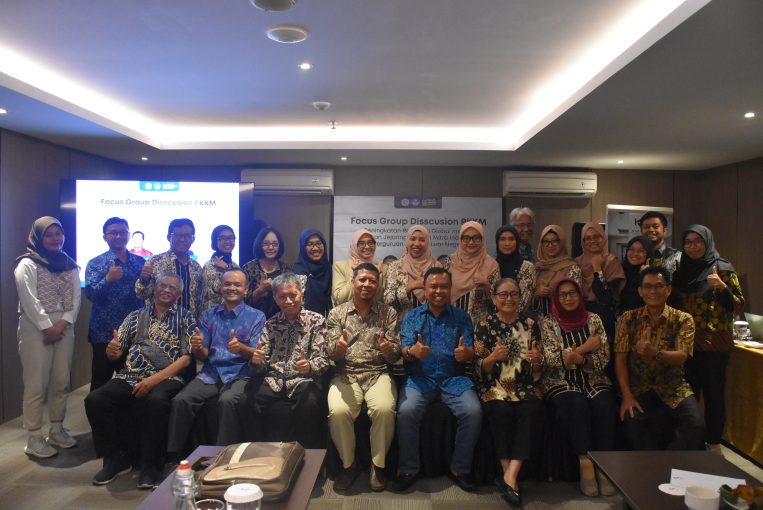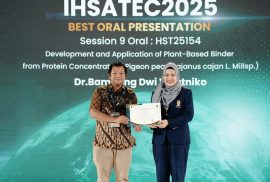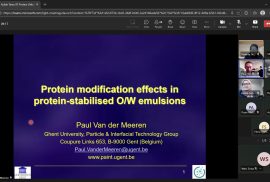
The Department of Food and Agricultural Product Technology (TPHP) at Universitas Gadjah Mada (UGM) held a Focus Group Discussion (FGD) on the theme “Enhancing Global Recognition through Expanding Networks with Industry Partners and Overseas Universities.” Held on Thursday, June 20, 2024, the event aimed to prepare TPHP graduates to be industry-ready for the food sector while supporting the Sustainable Development Goals (SDGs)—particularly in improving education quality, creating decent job opportunities, and promoting economic growth.
This FGD featured two experienced speakers: Ir. Gunawan Wibisono, President Director of PT Sumber Inti Pangan, and Boedi Sardjana Julianto, S.T.P., Director of PT Jaringan Sumber Daya.
 The first session was delivered by Ir. Gunawan Wibisono, who spoke on “MBKM Industrial Internship.” According to him, industrial internships are one of the key components of the Merdeka Belajar Kampus Merdeka (MBKM) program, providing students with valuable hands-on experience. This exposure is essential for improving students’ overall competencies, equipping them to enter the workforce or even become job creators—aligned with SDG 8: Decent Work and Inclusive Economic Growth.
The first session was delivered by Ir. Gunawan Wibisono, who spoke on “MBKM Industrial Internship.” According to him, industrial internships are one of the key components of the Merdeka Belajar Kampus Merdeka (MBKM) program, providing students with valuable hands-on experience. This exposure is essential for improving students’ overall competencies, equipping them to enter the workforce or even become job creators—aligned with SDG 8: Decent Work and Inclusive Economic Growth.
He also highlighted several ongoing challenges in the food industry, such as HACCP development, industrial waste management, implementation of food safety management systems, regulatory updates, thermal process validation, and the cultivation of a food safety culture. Gunawan pointed out some common student weaknesses, including unrealistic idealism, limited problem-solving skills, and low levels of literacy. To address this, he recommended that students engage more with journal reviews, practice problem-solving through case studies, and apply theoretical knowledge during internships. He also proposed relevant internship topics such as the implementation of food safety management systems (especially FSSC), sanitation and hygiene, and laboratory analysis.
 The second presentation was given by Boedi Sardjana Julianto, S.T.P., who discussed the “Opportunities and Challenges in the Seaweed Industry.” He noted that Indonesia is the second-largest producer of seaweed in the world, yet research on this topic remains limited. Boedi emphasized the importance of innovation in transforming seaweed into various products—especially food products—that could open new markets and significantly boost the national economy, in line with SDG 9: Industry, Innovation, and Infrastructure.
The second presentation was given by Boedi Sardjana Julianto, S.T.P., who discussed the “Opportunities and Challenges in the Seaweed Industry.” He noted that Indonesia is the second-largest producer of seaweed in the world, yet research on this topic remains limited. Boedi emphasized the importance of innovation in transforming seaweed into various products—especially food products—that could open new markets and significantly boost the national economy, in line with SDG 9: Industry, Innovation, and Infrastructure.
He also stressed the need for consumer education on the nutritional, environmental, and economic benefits of seaweed-based products, which can stimulate market demand and help build a positive global reputation for Indonesia’s seaweed industry.
In addition, both speakers underlined the importance of soft skills and self-branding for students entering the food industry. Communication, leadership, teamwork, and adaptability are vital in the professional world, aligned with the SDG goal of improving education quality and ensuring lifelong learning. Students are encouraged to develop a strong personal brand that reflects both their competencies and professional character, providing an added advantage in an increasingly competitive food industry.
Through this FGD, it is hoped that TPHP UGM faculty members will be better equipped to guide students in becoming more confident and well-prepared to face the challenges of the food industry, and to build successful careers both nationally and globally.




